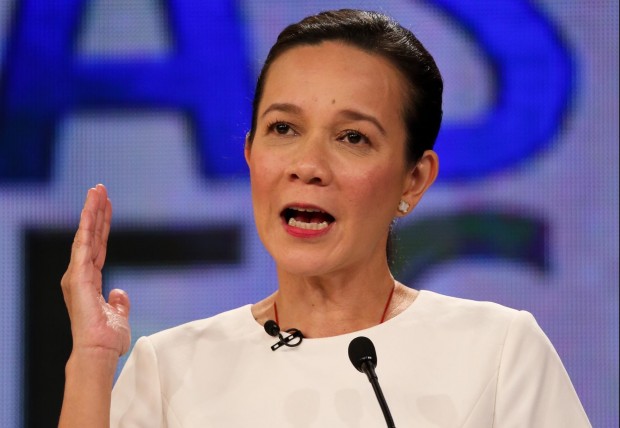SC asked to reverse ruling on Poe DQ case
Detractors of Senator Grace Poe on Friday asked the Supreme Court to reverse its ruling declaring that she is qualified to run for president in the upcoming May elections, otherwise, its decision “will go down the annals of judicial history as a perversion of the Constitution.”
In the joint motion for reconsideration filed by Atty. Estrella Elamparo, former Senator Francisco “Kit” Tatad, former University of the East Law Dean Amado Valdez and political science Professor Antonio Contreras, they told the high court that with its ruling, there is a danger that a “true nuisance candidate” will be elected, disenfranchising millions of Filipinos.
“Such ignominy will forever taint the Honorable Court’s legacy,” the motion stated.
The high court, voting 9-6, declared that Poe is qualified to run for the highest position in the land. The ruling said there was no material misrepresentation on the part of the senator when she declared in her certificate of candidacy (COC) that she is a natural-born Filipino and a resident of the country for 10 years.
READ: SC: Poe a natural-born Filipino citizen, PH resident for 10 years
Article continues after this advertisementUnder Article VII Section 2 of the 1987 Constitution, natural-born Filipino citizenship and 10-year residency are among the basic requirements to qualify to run for president.
Article continues after this advertisementIn its ruling, the high court, through Associate Justice Jose Perez, said Poe is presumed to be a natural-born Filipino based on circumstances such as physical appearance as well as statistical probability.
The high court agreed with the Office of the Solicitor General’s assertion that Poe is probably natural-born based on data from the Philippine Statistics Authority showing that more than 99 percent of babies born in the 1960s and 1970s, both in Iloilo and the entire country, were natural-born.
The high court also said Poe is probably natural-born because she was found at a Catholic church in Iloilo and possesses “typical Filipino features such as height, flat nasal bridge, straight black hair, almond shaped eyes and an oval face.
In their motion, Poe’s detractors argued that she cannot be considered natural-born citizen because only seven justices ruled in her favor. Of the nine justices, Associate Justices Alfredo Benjamin Caguioa and Diosdado Peralta limited their ruling on the supposed existence of grave abuse of discretion on the part of the Commission on Elections (Comelec).
READ: Debate continues to rage on SC ruling on Poe
They added that there is also no such thing as natural-born citizen by statistical probability and based on physical appearance.
They pointed out that by inserting “into our jurisprudence a kind of profiling that could be considered racist in character, when it has for the first time used as basis for justifying the claim of petitioner [Poe] of being natural born the physical appearance of a person by referring to a ‘Filipino look.’”
“Citizenship by physicality would beg the question of precise anatomical and aesthetic attributes. These are concepts that are too radical and have led to this Honorable Court to breach the boundaries of its authority, since it no longer just interpreted the Constitution, but in fact has legislated new parameters for determining natural-born status not contained in the plain text of the Constitution, or even in the intent of its framers,” the motion stated adding that it is considered tantamout to culpable violation of the Constitution.
Elamparo added that their rights to due process were also violated because they were not even given the opportunity to contest the statistics presented by the Office of the Solicitor General which was adopted by the high court in its ruling.
They added that the high court also erred when it declared that re-acquisition of citizenship under Republic Act (RA) 9225 or the Citizenship Retention and Reacquisition Act of 2003 already gave Poe the natural-born status.
Under RA 9225, the motion pointed out that repatriation can only be availed of by those who lost their citizenship due to (1) desertion of the armed forces; (2) services in the armed forces of the allied forces in World War II; (3) service in the Armed Forces of the United States at any other time; (4) marriage of a Filipino woman to an alien and (5) political and economic necessity.
“The enumeration does NOT include willful and voluntary act on the part of the citizen to intentionally apply for a change of citizenship in a foreign country,” the motion stated.
The motion also pointed on the inconsistency of the Supreme Court in declaring that Comelec has no jurisdiction to determine the qualifications of Poe.
They noted that in the case of Tecson vs Comelec, the case that upheld the citizenship of Poe’s adoptive father, the late action king Fernando Poe Jr., the high court recognized the power of the Comelec to pass upon the qualifications of a presidential candidate. RAM
